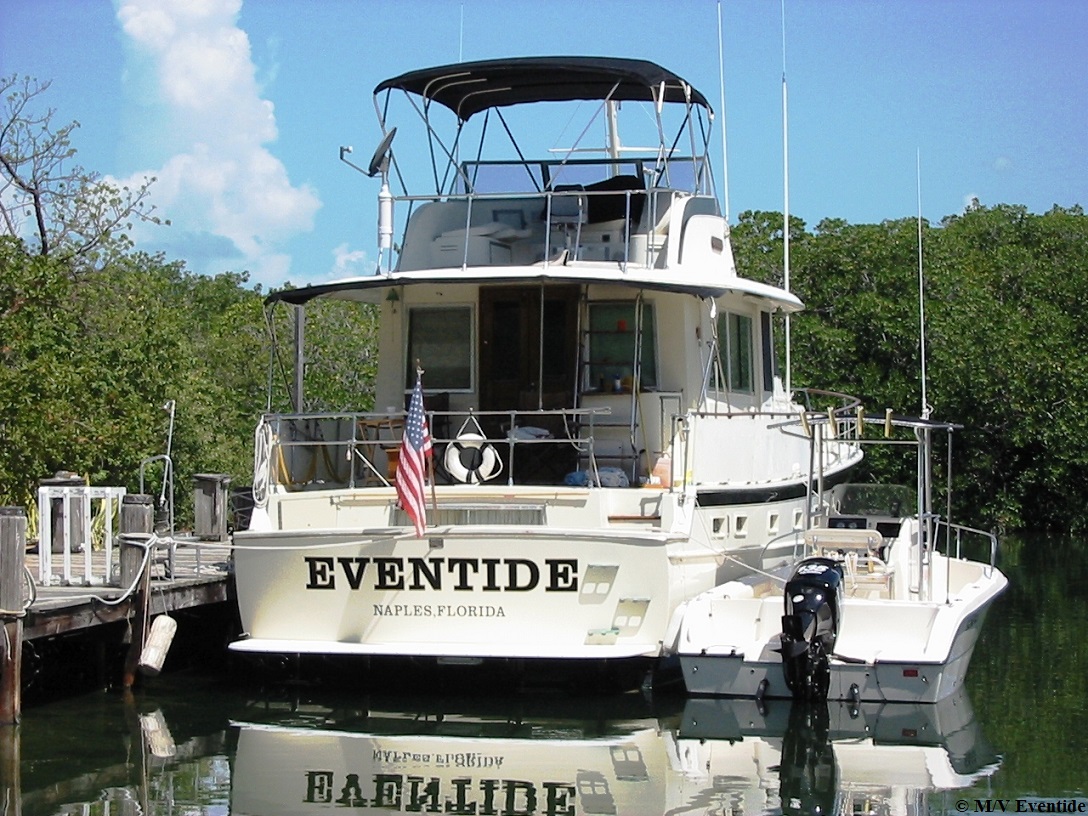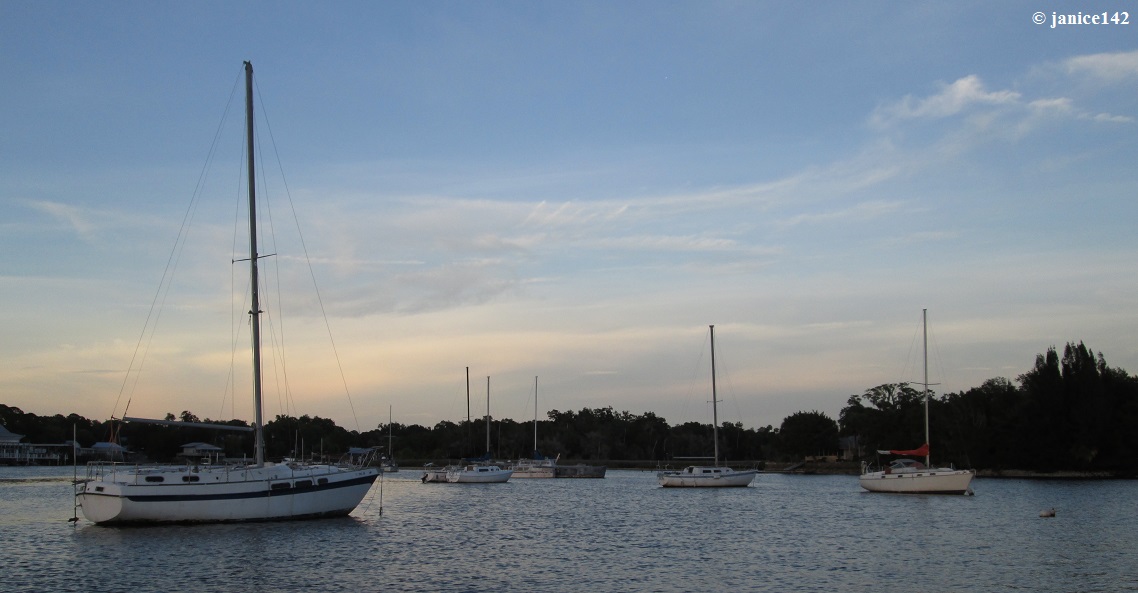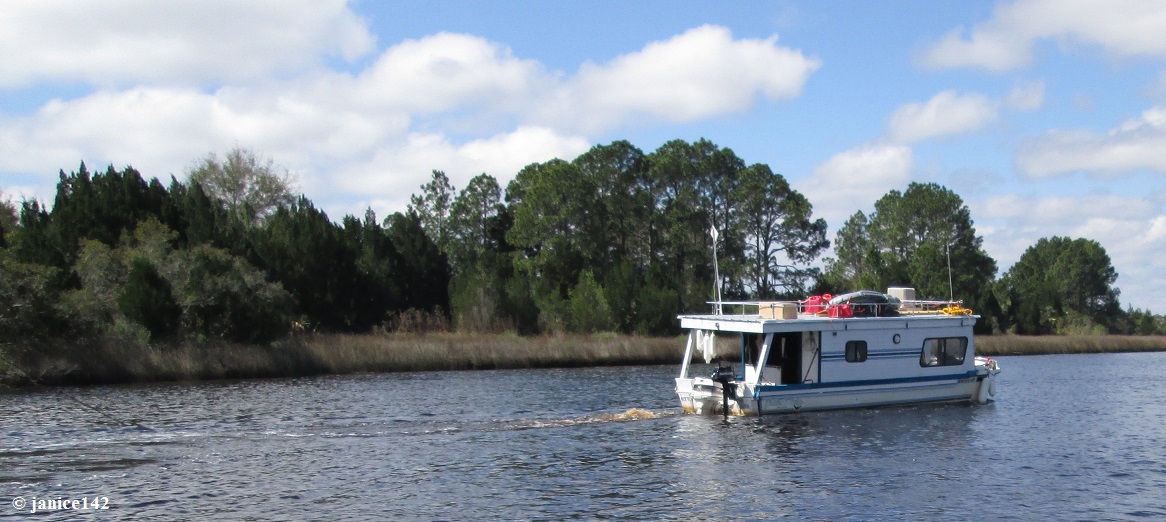![]() Home |
The Boat |
First Mate
|
Admiral |
Guestbook
Home |
The Boat |
First Mate
|
Admiral |
Guestbook
Date: 13 October 2013. Making the Right Choice.
© janice142
Picking the right initial boat is a job that is often fraught with equal measures of anticipation and fear. Over the years I suppose I have seen about every mistake known to man (and woman) made when buying that first boat. Today's article will focus on some of the ways you can avoid being a statistic in the Failure File and instead can become a real boater.

For folks who prefer to start at the top the Hatteras
Eventide is a
classic platform.
Though gorgeous, the owner of this boat had years of experience when he moved up to said vessel. For the right couple (entertainment is a breeze on a gem of this size) a yacht such as this can be considered a good choice. Boat brands such as Hatteras with well-regarded reputations as to build quality hold their value. For the rest of us though, we need to start out a bit further down on the scale and work our way up so to speak. And you know what? My little trawler anchors in the same spots as the big guys. Well, I'll probably be a bit closer to the beach as Seaweed draws just three feet.

If your budget is such that you can afford a one week or two charter, that would be an option for looking at the overall "what's it like" in the best of situations. And with reluctant spouses a trip to the Caribbean in the dead of winter does have a charm all of its own. Trust me on that.
However, after that initial holiday in paradise and before you buy your Last Boat, it's important that you gain some inexpensive experience. That means, specifically, that you buy a small cheap boat similar to your dream boat. Folks that dream of trawler cruising should not buy a ketch any more than aspiring rag-baggers should buy a speedboat.
A few of books will help you as your journey begins. I recommend these
three:
The Intricate Art of Living Afloat - Life aboard a sailboat on a low income (dated but still valuable, especially if you're on a budget)
Tricks of the Trades
- Boating for the relaxed leisurely cruisers such as self (you don't have to be rich to enjoy this life)
Chapman's Piloting & Seamanship
- The tome on how-to-boat (I don't think I've ever been on a live-aboard boat that didn't have a copy of Chapman's)
|
I suggest you read these
first via the library system in your area. Those you like best
you should purchase. Affliliate Links → |
 The Intricate Art of Living Afloat by Clare Allcard |
 Tricks of the Trades by Bruce Van Sant |
 Chapman's Piloting & Seamanship pick the latest edition |

Oremae is a Morgan ketch, and she's a beauty -- definitely
a Last Boat!
If your fantasies involve sailing, then buy a cheap production model for afternoon trips and practice your boating skills. Spend no more than $1000 -- you want a boat you can use and learn on, not the Queen Mary that a ding in the paint job will cost $$$ to repair. Those little $1k boats are generally worth about what you paid at the end of a year.
And no, a small boat (24' or so) will not be comfortable long term or even short term for that matter -- you will want more space and lots of the conveniences to move above the camping stage your practice boat will offer. It is okay to rough it a bit while learning. You will be able to ascertain what is important to for your happiness. After being out here in the boating community you will be in a far better place to visit with other boats that are more in line with your Last Boat desires.
An inexpensive boat is great for obtaining practical
experience afloat.

Under no circumstances (NONE!!!) should you do anything more than maintain your starter boat. And do not buy a boat that needs work -- find one that immediately (today) you can sail/use. This is not the one to improve; she is a learning tool. Though I expect you to fix what you break, do not do anything else.
|
Do purchase
Don Casey's This Old Boat, Second Edition
when you are ready to buy. That book will give you the
a great insight into how to prioritize and maintain/fix issues
with your new/old boat. I recommend it strongly. |
|
A starter boat is for gaining experience,
not for sailing across oceans.
Use it, repair what you break but otherwise consider it a learning tool
only.
More than one time I've seen a newbie take a boat and "upgrade" it into a worthless hunk of fiberglass. A $1k sailboat will have issues -- but you (collectively) will not be taking her across the Atlantic. You should be learning how to raise sails, lower sails, point her where you want to go, and get her home and docked without taking out the pier.
Analogy: You would not buy your child a Mercedes to learn to drive around the block. A Ford Escort, older, reliable and not fancy will allow a kidlet to learn to parallel park, steer up winding country roads and in town. You should purchase the same type of vessel for your learning experience: a boat not a fancy yacht!
Learning to drive an RV is much more difficult than a
smaller vehicle. Start smaller to build skills.

At the end of your year long experiment in boating the practice you have had aboard your starter boat will be useful when it comes time to determine the boat that will better suit you in the future. Presuming you have repaired what you broke, you should be able to sell that boat to another newbie for their year or two of fun. You should break even financially. Even if you do not get your full $1,000 back, the price of the education is more valuable than any monetary loss.
If boating is not for you, it is best to
find out early rather than after
you have poured your wealth into a dream that is not as you imagined.

Waterfront living does not have to be in a house. The family car can be a go-fast center console.
For those that dream of trawler cruising, a smaller cuddy cabin will get you out for an afternoon or three. Even if your beginner boat will go fast, try puttering along at 6 or 7 knots as that is what you will do on your larger home. Of course these smaller boats are not as spacious nor comfortable as a real cruising yacht, yet that does not denigrate their value as a learning tool.
Some folks REALLY dislike going slow. If that is you, learning that early is beneficial. And yes, there are larger boats that can go fast. Those vessel owners spend a lot of money on fuel.
For trawler guys and girls, your learning boat will come at a higher initial cost -- count on spending in the range of $5k. Still, the same criteria comes into play: buy a production model (25' range) -- a boat with a thousand others just like her. Most likely you will end up with a go-fast planing hull that has big gas engines. That is okay.
I'm going to speak slowly so the boys will be able to
comprehend:
Just because the throttle can go all the
way forward does not mean it must do so.
Run slowly and get the feel of boating without the concern for wind direction that sailors have. Fuel economy will be your reward. Most important of all: you can get in a whole lot less trouble at five knots than ten, or more.
I confess there is a simple joy in puttering along at five knots inside my pilothouse when the rain is falling. Sailing is for masochists! [spoken like the decadence loving power-boater I am] Yes, sailing can be and is fun too but us "stink-pot" owners have to tweak the "wind-bags" occasionally just to keep 'em in line!
That's it from the waterfront today. Until next time...
What was your first live-aboard boat?
And are you now aboard your Last Boat? What kind (size too) is she?
|
Regarding the Comments Section, found at the end of every article:
|
COMMENTS:
© 2013, 2023
Categories: Boats, Books, Comfort, Entertainment, Money, Recommendations
Pull the Plug ~
Previous Post ... ![]() ... Next Post ~
Portlight Pretties
... Next Post ~
Portlight Pretties
The Archive holds a running list with synopsis of published articles, and links to same.
A favorite aphorism: A smart man learns from his mistakes, a wise man learns from the mistakes of others.
Every gift helps.
The Cruising Kitty is what boaters refer to as spending money. There's never enough aboard Seaweed!
I am also an Amazon Affiliate.






